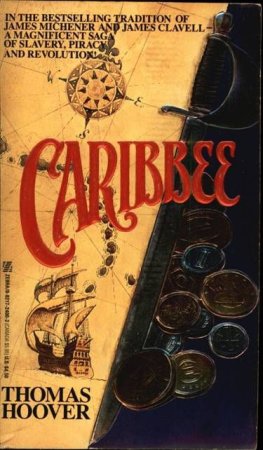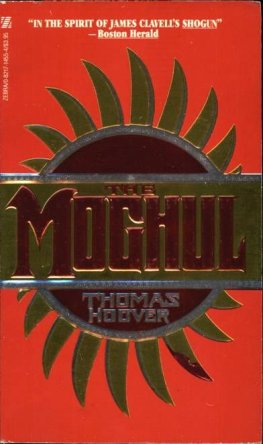Thomas Hoover - Caribbee
Here you can read online Thomas Hoover - Caribbee full text of the book (entire story) in english for free. Download pdf and epub, get meaning, cover and reviews about this ebook. genre: Adventure. Description of the work, (preface) as well as reviews are available. Best literature library LitArk.com created for fans of good reading and offers a wide selection of genres:
Romance novel
Science fiction
Adventure
Detective
Science
History
Home and family
Prose
Art
Politics
Computer
Non-fiction
Religion
Business
Children
Humor
Choose a favorite category and find really read worthwhile books. Enjoy immersion in the world of imagination, feel the emotions of the characters or learn something new for yourself, make an fascinating discovery.
- Book:Caribbee
- Author:
- Genre:
- Rating:4 / 5
- Favourites:Add to favourites
- Your mark:
- 80
- 1
- 2
- 3
- 4
- 5
Caribbee: summary, description and annotation
We offer to read an annotation, description, summary or preface (depends on what the author of the book "Caribbee" wrote himself). If you haven't found the necessary information about the book — write in the comments, we will try to find it.
Caribbee — read online for free the complete book (whole text) full work
Below is the text of the book, divided by pages. System saving the place of the last page read, allows you to conveniently read the book "Caribbee" online for free, without having to search again every time where you left off. Put a bookmark, and you can go to the page where you finished reading at any time.
Font size:
Interval:
Bookmark:
Thomas Hoover
Caribbee
1638
The men had six canoes in all, wide tree trunks hollowed out by burning away the heart, Indian style. They carried axes and long-barreled muskets, and all save one were bare to the waist, with breeches and boots patched together from uncured hides. By profession they were roving hunters, forest incarnations of an older world, and their backs and bearded faces, earth brown from the sun, were smeared with pig fat to repel the swarms of tropical insects.
After launching from their settlement at Tortuga, off northern Hispaniola, they headed toward a chain of tiny islands sprawling across the approach to the Windward Passage, route of the Spanish galeones inbound for Veracruz. Their destination was the easterly cape of the Grand Caicos, a known Spanish stopover, where the yearly fleet always put in to re-provision after its long Atlantic voyage.
Preparations began as soon as they waded ashore. First they beached the dugouts and camouflaged them with leafy brush. Next they axed down several trees in a grove back away from the water, chopped them into short green logs, and dragged these down to the shore to assemble a pyre. Finally, they patched together banana leaf ajoupa huts in the cleared area. Experienced woodsmen, they knew well how to live off the land while waiting.
The first day passed with nothing. Through a cloudless sky the sun scorched the empty sand for long hours, then dropped into the vacant sea. That night lightning played across thunderheads towering above the main island, and around midnight their ajoupas were soaked by rain. Then, in the first light of the morning, while dense fog still mantled the shallow banks to the west, they spotted a ship. It was a single frigate, small enough that there would be only a handful of cannon on the upper deck.
Jacques le Basque, the dense-bearded bear of a man who was their leader, declared in his guttural French that this was a historic moment, one to be savored, and passed a dark onion-flask of brandy among the men. Now would begin their long-planned campaign of revenge against the Spaniards, whose infantry from Santo Domingo had once burned out their settlement, murdered innocents. It was, he said, the start of a new life for them all.
All that remained was to bait the trap. Two of the hunters retrieved a bucket of fat from the ajoupas and ladled it onto the green firewood. Another scattered the flask's remaining liquor over the top of the wood, then dashed it against a heavy log for luck. Finally, while the men carefully checked the prime on their broad-gauge hunting muskets, le Basque struck a flint to the pyre.
The green wood sputtered indecisively, then crackled alive, sending a gray plume skyward through the damp morning air. Jacques circled the fire triumphantly, his dark eyes reflecting back the blaze, before ordering the men to ready their dugouts in the brushy camouflage along the shore. As they moved to comply, he caught the sleeve of a young Englishman who was with them and beckoned him back.
"Anglais, attendez ici. I want you here beside me. The first shot must count."
The young man had been part of their band for almost five years and was agreed to be their best marksman, no slight honor among men who lived by stalking wild cattle in the forest. Unlike the others he carried no musket this morning, only a long flintlock pistol wedged into his belt. In the flickering light, he looked scarcely more than twenty, his face not yet showing the hard desperation of the others. His hair was sandy rust and neatly trimmed; and he alone among them wore no animal hides-his doublet was clearly an English cut, though some years out of fashion, and his sweat-soiled breeches had once been fine canvas. Even his boots, now weathered and cracked from salt, might years before have belonged to a young cavalier in Covent Garden.
He moved to help Jacques stoke the fire and pile on more green limbs. Though the blaze and its plume should have been easily visible to the passing frigate by now, the sleepy lookout seemed almost to fail to notice. The ship had all but passed them by before garbled shouts from its maintop finally sounded over the foggy waters. Next came a jumble of orders from the quarterdeck, and moments later the vessel veered, its bow turning into the wind, the mainsail quickly being trimmed.
As it steered into the bay, Jacques slapped at the buzzing gnats around them and yelled out a Spanish plea that they were marooned seamen, near death. As he examined the frigate through the morning fog, he grunted to himself that she was small, barely a hundred tons, scarcely the rich prize theyd braved the wide Caribbean in dugouts for.
But now a longboat had been launched, and two seamen in white shirts and loose blue caps were rowing a young mate toward the pair of shadowy figures huddled against the smoky pyre at the shore. Le Basque laughed quietly and said something in a growl of French about allowing the ship's officers to die quickly, to reward their hospitality.
The younger man wasn't listening. Through the half-light he was carefully studying the longboat. Now he could make out the caps of the seamen, woolen stockings loosely flopping to the side. Then he looked back at the ship, seamen perched in its rigging to stare, and thought he heard fragments of a familiar tongue drifting muffled over the swells. Next a crowd of passengers appeared at the taffrail, led by a well-to-do family in ruffs and taffetas.
They weren't Spanish. They couldn't be.
The man wore a plumed hat and long curls that reached almost to his velvet doublet, London fashions obvious at hundreds of yards. The woman, a trifle stout, had a tight yellow bodice and long silk cape, her hair tied back. Between them was a girl, perhaps twelve, with long chestnut ringlets. He examined the rake of the ship once more, to make doubly sure, then turned to Jacques.
"That ship's English. Look at her. Boxy waist. Short taffrail. Doubtless a merchantman out of Virginia, bound for Nevis or Barbados." He paused when he realized Jacques was not responsive. Finally he continued, his voice louder. "I tell you there'll be nothing on her worth having. Wood staves, candle wax, a little salt fish. I know what they lade."
Jacques looked back at the ship, unconcerned. "Cela n'a pas d'importance. Anglais. There'll be provisions. We have to take her."
"But no silver. There's no English coin out here in the Americas, never has been. And who knows what could happen? Let some ordnance be set off, or somebody fire her, and we run the risk of alerting the whole Spanish fleet."
Now le Basque shrugged, pretending to only half understand the English, and responded in his hard French. "Taking her's best. If she truly be Anglaise then we'll keep her and use her ourselves." He grinned, showing a row of blackened teeth. "And have the women for sport. I'll even give you the pretty little one there by the rail, Anglais, for your petite amie. " He studied the ship again and laughed. "She's not yet work for a man."
The younger man stared at him blankly for a moment, feeling his face go chill. Behind him, in the brush, he heard arguments rising up between the English hunters and the French over what to do. During his years with them they had killed wild bulls by the score, but never another Englishman.
"Jacques, we're not Spaniards. This is not going to be our way." He barely heard his own words. Surely, he told himself, we have to act honorably. That was the unwritten code in the New World, where men made their own laws.
"Anglais, I regret to say you sadden me somewhat." Le Basque was turning, mechanically. "I once thought you had the will to be one of us. But now" His hand had slipped upward, a slight motion almost invisible in the flickering shadows. But by the time it reached his gun, the young man's long flintlock was already drawn and leveled.
Font size:
Interval:
Bookmark:
Similar books «Caribbee»
Look at similar books to Caribbee. We have selected literature similar in name and meaning in the hope of providing readers with more options to find new, interesting, not yet read works.
Discussion, reviews of the book Caribbee and just readers' own opinions. Leave your comments, write what you think about the work, its meaning or the main characters. Specify what exactly you liked and what you didn't like, and why you think so.











